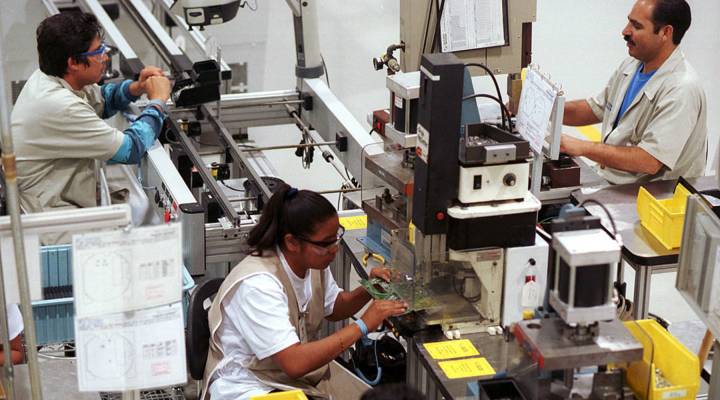
What people get wrong when they talk about NAFTA
What people get wrong when they talk about NAFTA

This story is from our special series that explores NAFTA’s role in our economy from the perspective of workers, business owners and trade negotiators. What exactly is NAFTA? And what happens if it changes? Join us to discuss how one of the most hotly contested issues in our society shapes the way we live.
This week, Marketplace looked at the history of the North American Free Trade Agreement and explored its role in our economy from the perspective of workers, business owners and trade negotiators. What exactly is NAFTA? And what happens if it changes? To wrap up a week of special coverage, Marketplace host Kai Ryssdal talked with Marc Melitz, a professor of economics at Harvard University. Below is an edited transcript of their conversation.
Kai Ryssdal: What, in your mind, is the biggest thing that people get wrong when they talk about NAFTA?
Marc Melitz: I would say that people do not understand how trade agreements such as NAFTA can generate gains for all of the countries involved. And it’s been a good thing for the U.S. as well as for our partners in Mexico and Canada.
Ryssdal: Well, explain that a little bit, because, you know, you go out in this country and you talk to enough people, and the overwhelming viewpoint of NAFTA is negative; that it has lost jobs and lowered wages, all of that stuff that I’m sure you’ve heard on and on again.
Melitz: Exactly. The focus tends to be on a job that can be somehow tied to being lost because of NAFTA. But we don’t pay anywhere near as much attention to all of the jobs that are created because of NAFTA. And so, in the end, the analysis will show that there is very little effect on overall unemployment from a trade agreement such as NAFTA. But the perception remains that it has been a huge job killer.
Ryssdal: And is that just political rhetoric that gets the credit, or the blame, I suppose, for that feeling people have?
Melitz: I mean, it tends to be a natural thing. And I think this happens equally across the different parties. Another part of it is just that the job losses are much more concentrated. And so, they’re much more visible, much more salient, and the pain associated with that is real. So, we tend to focus on that side of the effects.
Ryssdal: Let’s venture into the hypothetical here for just a second, and let’s say President Trump either successfully renegotiates or pulls the United States out of NAFTA. Would the people who have been on the losing end of that deal still be on the losing end of the American economy?
Melitz: So, I’m afraid that the answer would be yes. U.S. manufacturing jobs have seen a steady decline starting in 1960 by a couple of percentage points a year. This happened way before NAFTA, way before there’s been a huge wave of imports from China. Automation is one big part of that. And so it’s hard to see that had NAFTA not been in place or if we significantly abridged NAFTA now, that that is going to bring back many of those manufacturing jobs. Most likely what would happen is it would divert the pattern of trade away from trade from Mexico and with other countries.
Ryssdal: Well, let me follow up on something you just alluded to. What would the American economy look like if NAFTA had never been born?
Melitz: Sure. So I think there are two effects. There is a huge difference between abridging an existing trade relationship, which has a huge disruption effect, versus not engaging, say, in a new one, such as cancelling the plans for the Trans-Pacific Partnership. But let’s say that NAFTA had never happened. The effect on the U.S. economy would be that prices would be higher. Consumers can enjoy lower prices for goods that are imported from Mexico. And firms would be less efficient because NAFTA has allowed supply chains to be streamlined and consolidated across the whole North American continent. And yes, we would have maybe a few more jobs in certain manufacturing sectors but we would have lost the opportunity to grow some other sectors — some of them in manufacturing, and a lot of them in services such as in engineering and in R&D and in marketing.
Ryssdal: What’s your guess, then, as to what happens with the president’s promises?
Melitz: Oh, I have no idea. That seems to change by the day, or by the week. I don’t feel like I have enough information to answer that.
Ryssdal: Mark Melitz is a professor of political economy at Harvard University. Professor, thanks very much for your time, sir.
There’s a lot happening in the world. Through it all, Marketplace is here for you.
You rely on Marketplace to break down the world’s events and tell you how it affects you in a fact-based, approachable way. We rely on your financial support to keep making that possible.
Your donation today powers the independent journalism that you rely on. For just $5/month, you can help sustain Marketplace so we can keep reporting on the things that matter to you.


















